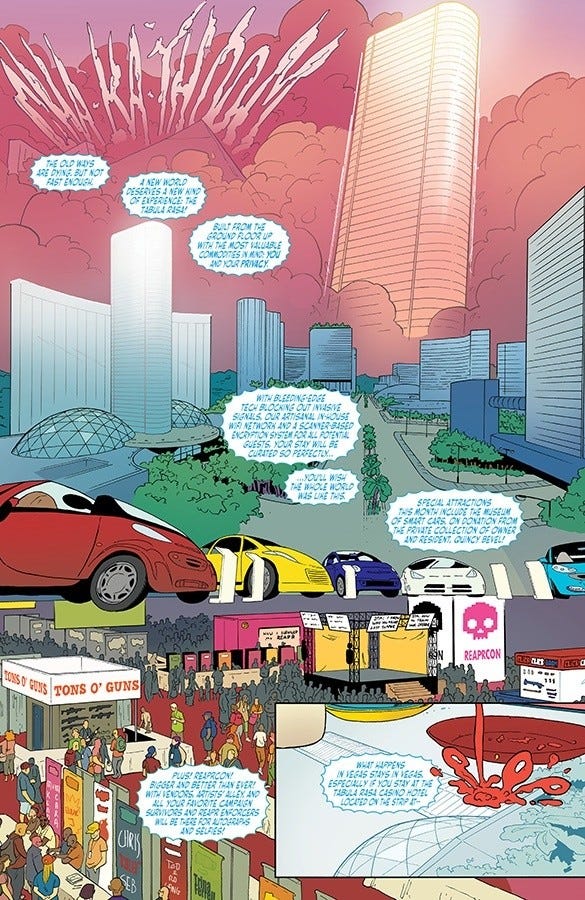The past few years, I’ve come across times when Social Credit is the world’s biggest antagonist. Mostly in manga, even before social credit became a mainstream topic. I wonder why.
Manga’s Reaction To Social Media
My first big exposure to the concept of Social Credit came from the manga Real Account. It was a death game series where a person’s profile is put in contest with the profile owner. The stakes get higher the more times secrets and “true fans” are put to the test. Every act felt like walking on egg shells where survival turns into keeping a hold of your sense of self.
But then things got weird. Two characters are actually living profiles, the villains’ plans are convoluted and messy, and the series starts to lose direction.
Frankly South Park might have had a better go at these with its two Facebook episodes.
Social Media Presence = Social Mobility
That said, I think Japan has a more intimate relationship with the concepts of social anxiety. From test scores to relationships just for professional networking, Japan’s creatives could practically see social credit coming decades away.
Maybe that’s a Confucianist thing… Might explain why South Korea’s #Killstagram went into how social media’s pressure to conform to the strongest mood can have nasty effects. Because Confucianists have been doing it analog for centuries.
Even in less social media focused manga, the more technocratic scenarios in Love and Lies and…a canceled Shonen Jump series are tied deeply into how much a society would practically revere algorithms in almost cult-like fashion. Especially if it ties into an intense progressive reform campaign.
Now don’t take what I just said the wrong way. Progression isn’t just being nicer to people who had it bad anymore than conservation is just preserving what put them there.
Progression in this case is simply making the current status quo more efficient. Not so much that the system is broken, it just needed the cracks to be filled with a digitized gold. If it means more housed and an overall chance for a better life, why not embrace it?
The Social Credit Score Society
The East and West have made their own reasons why. Often in two forms of technocracy: government backing/commissions and tech company product integration.
Psycho-Pass and Man-Eaters go into how trying to quantify the chances of…crime(?)…medical emergencies(?) can get ugly. Bullying vulnerable people to keep everyone else’s stress low, bystander syndrome from all of the comforts given by the system, and recreating forms of institutional bigotry. Like drinking from different fountains.
Crowded and Averee explore how tech companies practically become a privatized government by integrating products as public services. This all but gives the officials means to sabotage other peoples’ lives. Even when they’re exposed for misconduct, a newer and less intrusive competing product replaces the old one.
Social Credit In-Depth
Finally there are two more recent series that latch onto people. The AWA one-shot Death Ratio’d and the manga War of the Adults. Both of these deal with leads who wake up from comas into worlds they don’t recognize. Because social credit has changed society entirely.
These settings explore some of the more intense effects of Social Credit. Everything from tuitions, job applications, to residency are determined by your influence. All it takes to gain or lose more is how well you can make a mood. Or how well somebody else can do that for you.
Thing is-War of the Adults had only just started time of writing. So it hasn’t gone into too much. Except that even with transparency that people like to champion, there’s no authenticity.
All it takes is putting on a good show to get away with just about everything including harassment and corruption. Or reactions that go viral with the right weight thrown around. Put another way, your entire existence is a proxy war and every army is full of mercenaries.
Death Ratio’d shows the things that aren’t as public(?). People may celebrate others publicly, but they wouldn’t mind if someone at the top vanished so that their popularity is redistributed. Mainly because if your popularity isn’t on some bell curve, one more dislike gets you killed.
And the socially…handicapped. They have to live underground and work with more antisocial groups to survive. Often they’re the ones who make the toppers disappear by exploiting that gaps.
What Does Social Credit Show?
When I hear about how Social Credit exists in banks, both Federal and PayPal, I can’t help but dread. Some cultures have already had exposure to the soul crushing nature of social anxiety. Worse, as someone on the autistic part of the neurodivergent spectrum exposed to these, it never felt more existential.
Surveillance and control where people have to fake it to make it. Even though I’ve been taught that that’s a bad thing. Social validation and identity where self-worth is shaped by a bunch of strangers’ public perception. Again taught that friends and family matter more than fitting in. Yet if you don’t fit in, you and they are cut off from the safety nets or worse. And it’s become so easy to not fit in when technology can display a good or bad status. Especially on who or whatever gets to decide a good or bad status. Meanwhile it’s always the alienated people that feel the most weight of this conformity. Often over things they have no control of.
…I don’t know…I just gotta end it here.






